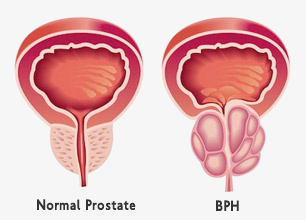Benign Prostatic Hypertrophy (BPH)
Urologic diseases - Symptoms - Diagnosis - Treatment
Description
Frequent benign disease in men > 50 years, does not threaten ( directly) life , but it can completely disrupt your daily routine as you get older, the prostate increases in size and the greater it gets prevents normal urination. It is estimated that 50 % of men aged 60 years, suffering from symptoms of enlarged prostate . So the first symptoms observed by a person suffering from hypertrophy of the prostate is a delay in onset of urination as well as evening visits to the toilet . When even these visits increased ( 3 times more) sleep is disrupted detuned and the next day patients present fatigue and drowsiness .
It is estimated that 50 % of men aged 60 years, suffering from symptoms of enlarged prostate . So the first symptoms observed by a person suffering from hypertrophy of the prostate is a delay in onset of urination as well as evening visits to the toilet . When even these visits increased ( 3 times more) sleep is disrupted detuned and the next day patients present fatigue and drowsiness . Other symptoms that can affect the patient with BPH are:
frequent visit to the toilet during the day ( frequent urination ) , intermittent urination , inability to " keep " his urine for a long time ( urinary urgency ) and decreased flow of urination.
Diagnosis
It is very important to visit the specialist ( urologist ) when these symptoms occur . Because the complaints of Prostate Cancer (CaP ) and hypertrophy are very similar, the specialist doctor will distinguish which of the two diseases is and will recommend the appropriate treatment. It was full of sense the encouragement of our ancient ancestors ' better anticipate than to cure ! ".Treatment
The treatment of BPH consists of:1.Conservative treatment
2. Surgical treatment.
The conservative (medication): a) Drugs that shrink the prostate (Finesteride, Avodart, Libeprosta), b ) Drugs that free the urination (Omnic, Ofuxal, Pradif, Xatral etc. )
In invasive - surgical methods for treating BPH, we should mention :
Video 1 : Animated Vaporization of the prostate
2- The open prostatectomy : Surgery performed very scarcely nowadays and is open incision and is reserved for very large prostates (greater than 100gr).
3- The transurethral prostatectomy using Bipolar Diathermy (TURIS): An emerging and promising method has the advantage of being minimal invasive so patient looses less blood during surgery and goes home quicker than with other surgical techniques.
4- Placing intra-urethral (stents): method with limited use. Early initiation of treatment for BPH helps to avoid unpleasant complications (urinary tract infections, bladder stone formation ,urinary retention, kidney damage) and return the patient to a normal lifestyle.




